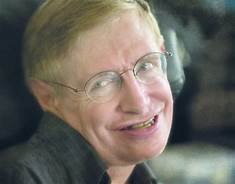Stephen Hawking Memories
I had the pleasure of seeing Stephen Hawking present his scientific work a couple of times. The more memorable was a small workshop in cosmology held at Cambridge University, in the summer of 1974 or 1975, for a two week period. He was there every day as I recall, and presented. At that time he did not have a voice synthesizer, so he spoke through an interpreter, a graduate student who was a collaborator. I was a mere graduate student myself at the time. He had just recently published his famous "Black Hole explosions" paper in Nature, https://www.nature.com/articles/248030a0. It was a shock to the astrophysics community, used to thinking of black holes in classical, non-quantum, terms.
What he had found, is that black holes have thermodynamic and quantum effects. They have a very low temperature (less than a millionth of a degree for a solar mass) and radiate photons and neutrinos at a very low rate. The lifetime of a solar mass black hole is of order 10 million trillion trillion trillion trillion trillion years!

Here is what I wrote about Hawking's best known work in my book Dark Matter, Dark Energy, Dark Gravity:
"Stephen Hawking showed that in contrast to the classical view of black holes as always gaining mass, that they could lose mass as well. In general relativity nothing can escape from a black hole once it gets sufficiently close, within what is known as the event horizon. But general relativity, as a classical theory, does not address the quantum nature that black holes also possess.
"A simple thought experiment invoking quantum mechanics shows that this is the case. We know from quantum mechanics that there is a sea of virtual particles that pop quickly in and out of existence 'borrowing' energy from the vacuum. These virtual particles typically would appear in pairs. Imagine an electron-positron pair is created exactly at the event horizon of the black hole. One particle would be headed inward, the other outward, to conserve momentum. The particle headed outward, if possessing sufficient velocity could escape, and continue as a real, not virtual particle. Thus over time, as these particle pairs were created, the black hole would emit energy.
"Hawking used a quantum thermodynamics calculation to determine the rate at which black holes radiate, or lose mass. The radiation is similar to black body thermal radiation, but the larger the black hole mass, the lower its temperature. As a result, the lifetime is proportional to the cube of the mass. For a stellar-sized black hole the lifetime is very long, and the effective temperature very low, about one tenth of a millionth of a degree above absolute zero...
"A three billion solar mass black, which might correspond to a very large [supermassive] black hole found today in the center of some galaxies, would take an incredible 10^96 [trillion trillion trillion trillion trillion trillion trillion trillion] years to evaporate!
"Primordial black holes, on the other hand, would radiate all their energy away very quickly. A black hole of one gram ..would be gone in a tiny fraction of a second, very soon after the Big Bang [started].
"Since the temperature of the black hole is so low, only very low energy particles are emitted, mainly very long wavelength photons and low energy neutrinos."
Stephen Hawking was an incredible communicator of scientific concepts to the public, and defender of scientific and human values. We will miss him greatly.